In the bustling Singaporean business landscape, staying compliant with tax regulations is paramount for the success and sustainability of enterprises, especially for Small and Medium-sized Enterprises (SMEs). The Inland Revenue Authority of Singapore (IRAS) plays a pivotal role in ensuring businesses fulfill their tax obligations promptly and accurately. Understanding IRAS’s documentation requirements is essential for businesses to navigate the complexities of tax compliance effectively. Let’s explore how Singaporean businesses can streamline their tax documentation processes to thrive in the dynamic business environment.
Understanding IRAS Documentation Requirements:
For Businesses with Annual Revenue Below $200,000:
For SMEs operating with an annual revenue below $200,000, IRAS offers the Simplified Documentation Scheme. This initiative recognizes the unique challenges faced by smaller businesses and aims to streamline the documentation process. Under this scheme, businesses are required to maintain basic documentation, including:
- Listing of Sales Transactions: Documenting all sales transactions enables businesses to accurately report revenue to IRAS, ensuring compliance with tax regulations.
- Listing of Costs: Tracking costs incurred by the business is crucial for calculating profits and determining tax liabilities. Maintaining a comprehensive list of expenses helps businesses manage their finances efficiently.
- Purchase Documents: Keeping records of all purchases made by the business is essential for verifying expenses and claiming eligible deductions. These documents provide evidence of business expenditures and support tax filings.
While manual record-keeping using tools like Excel is acceptable, leveraging system-generated software offers several advantages. Modern accounting software solutions tailored to the Singaporean business landscape provide features designed to facilitate tax compliance, making it easier for SMEs to manage their documentation effectively.
FAQs: Common Queries Answered:
For SMEs operating below the $200,000 revenue threshold, basic documentation suffices. This includes a listing of sales transactions, costs, and purchase documents. Utilizing system-generated software is recommended for efficient record-keeping.
If an SME’s turnover surpasses $200,000, comprehensive documentation becomes necessary. This includes maintaining sales invoices, credit notes, purchase bills, expense receipts, rental and loan agreements, bank statements, and more.
Modern accounting software often integrates seamlessly with document management systems, simplifying the process of maintaining and organizing documentation. This integration ensures a direct link between accounting records and supporting documents, enhancing efficiency and accuracy.
Conclusion:
In Singapore’s dynamic business landscape, SMEs must prioritize compliance with IRAS’s documentation requirements to navigate tax obligations successfully. By understanding the nuances of tax documentation and leveraging modern accounting software solutions, SMEs can streamline their processes and ensure compliance with tax regulations. This not only reduces the administrative burden but also allows SMEs to focus on growth and innovation. With IRAS’s support and guidance, Singaporean businesses can thrive and contribute to the vibrant economy of the Lion City.
